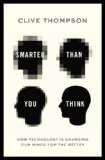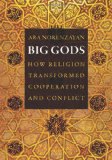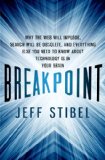September 12, 2013

Smarter Than You Think: How Technology is Changing Our Minds for the Better by Clive Thompson (Penguin, 2013)
(kindle ed.), (amazon.co.uk)
Book description from the publisher:
It’s undeniable—technology is changing the way we think. But is it for the better? Amid a chorus of doomsayers, Clive Thompson delivers a resounding “yes.” The Internet age has produced a radical new style of human intelligence, worthy of both celebration and analysis. We learn more and retain it longer, write and think with global audiences, and even gain an ESP-like awareness of the world around us. Modern technology is making us smarter, better connected, and often deeper—both as individuals and as a society.
In Smarter Than You Think Thompson shows that every technological innovation—from the written word to the printing press to the telegraph—has provoked the very same anxieties that plague us today. We panic that life will never be the same, that our attentions are eroding, that culture is being trivialized. But as in the past, we adapt—learning to use the new and retaining what’s good of the old.
Thompson introduces us to a cast of extraordinary characters who augment their minds in inventive ways. There’s the seventy-six-year old millionaire who digitally records his every waking moment—giving him instant recall of the events and ideas of his life, even going back decades. There’s a group of courageous Chinese students who mounted an online movement that shut down a $1.6 billion toxic copper plant. There are experts and there are amateurs, including a global set of gamers who took a puzzle that had baffled HIV scientists for a decade—and solved it collaboratively in only one month.
Smarter Than You Think isn’t just about pioneers. It’s about everyday users of technology and how our digital tools—from Google to Twitter to Facebook and smartphones—are giving us new ways to learn, talk, and share our ideas. Thompson harnesses the latest discoveries in social science to explore how digital technology taps into our long-standing habits of mind—pushing them in powerful new directions. Our thinking will continue to evolve as newer tools enter our lives. Smarter Than You Think embraces and extols this transformation, presenting an exciting vision of the present and the future.
Google Books preview:
See also: Book website
Comments (0)
- cognitive science,culture,new books
August 24, 2013

Big Gods: How Religion Transformed Cooperation and Conflict by Ara Norenzayan (Princeton University Press, 2013)
(kindle ed.), (amazon.co.uk)
Book description from the publisher:
How did human societies scale up from small, tight-knit groups of hunter-gatherers to the large, anonymous, cooperative societies of today–even though anonymity is the enemy of cooperation? How did organized religions with “Big Gods”–the great monotheistic and polytheistic faiths–spread to colonize most minds in the world? In Big Gods, Ara Norenzayan makes the surprising and provocative argument that these fundamental puzzles about the origins of civilization are one and the same, and answer each other.
Once human minds could conceive of supernatural beings, Norenzayan argues, the stage was set for rapid cultural and historical changes that eventually led to large societies with Big Gods–powerful, omniscient, interventionist deities concerned with regulating the moral behavior of humans. How? As the saying goes, “watched people are nice people.” It follows that people play nice when they think Big Gods are watching them, even when no one else is. Yet at the same time that sincere faith in Big Gods unleashed unprecedented cooperation within ever-expanding groups, it also introduced a new source of potential conflict between competing groups.
In some parts of the world, such as northern Europe, secular institutions have precipitated religion’s decline by usurping its community-building functions. These societies with atheist majorities–some of the most cooperative, peaceful, and prosperous in the world–climbed religion’s ladder, and then kicked it away. So while Big Gods answers fundamental questions about the origins and spread of world religions, it also helps us understand another, more recent social transition–the rise of cooperative societies without belief in gods.
Google Books preview:
See also: Author’s website
Comments (0)
- culture,human evolution,new books
August 14, 2013

Mortal Rituals: What the Story of the Andes Survivors Tells Us About Human Evolution by Matt J. Rossano (Columbia University Press, 2013)
(kindle ed.), (amazon.co.uk)
On December 21, 1972, sixteen young survivors of Uruguayan Air Force Flight 571 were rescued after spending ten weeks stranded at the crash site of their plane, high in the remote Andes Mountains. The incident made international headlines and spawned several best-selling books, fueled partly by the fact that the young men had resorted to cannibalism to survive.
Matt Rossano examines this story from an evolutionary perspective, weaving together findings and ideas from anthropology, psychology, religion, and cognitive science. During their ordeal, these young men broke “civilized” taboos to fend off starvation and abandoned “civilized” modes of thinking to maintain social unity and individual sanity. Through the power of ritual, the survivors were able to endure severe emotional and physical hardship. Rossano ties their story to our story, seeing in the mortal rituals of this struggle for survival a reflection of what it means to be human.
Google Books preview:
See also: Author’s Mortal Rituals blog at Psychology Today
Comments (0)
- cognitive science,culture,human evolution,new books
August 3, 2013

How To Like Everything: A Utopia by Paul Shepheard (Zero Books, 2013)
(kindle ed.), (amazon.co.uk)
Book description from the publisher:
How To Like Everything is a utopia. ‘Utopia’ is a word invented five hundred years ago at the start of the modern age as a description of the ideal society. It’s composed of Latin parts that taken together mean ‘no place’ or ‘nowhere’. We now use the word utopia to mean an impossible dream of perfection. How To Like Everything recasts the actual world, the forever-changing world we live in, as utopia: to make the impossible possible. This is not a dry academic debate. Paul Shepheard takes on his subject by threading questions, evidence and logic through hilarious, moving and thought-provoking stories. The action is set in the complicated city of Amsterdam, where he gets stuck in the briars of love affairs, existential decisions and conflicts with complete strangers. And the philosophy? He is a materialist. His utopia hinges on the question of whether there can be anything other than the present moment.
See also: Author’s website
Comments (0)
- culture,new books,reality
July 23, 2013

Breakpoint: Why the Web Will Implode, Search Will be Obsolete, and Everything Else You Need to Know about Technology Is in Your Brain by Jeff Stibel (Palgrave Macmillan, 2013)
(kindle ed.), (amazon.co.uk)
Book description from the publisher:
We are living in a world in which cows send texts to farmers when they’re in heat, where the most valuable real estate in New York City houses computers, not people, and some of humanity’s greatest works are created by crowds, not individuals.
We are in the midst of a networking revolution–set to transform the way we access the world’s information and the way we connect with one another. Studying biological systems is perhaps the best way to understand such networks, and nature has a lesson for us if we care to listen: bigger is rarely better in the long run. The deadliest creature is the mosquito, not the lion. It is the quality of a network that is important for survival, not the size, and all networks–the human brain, Facebook, Google, even the internet itself–eventually reach a breakpoint and collapse. That’s the bad news. The good news is that reaching a breakpoint can be a step forward, allowing a network to substitute quality for quantity.
In Breakpoint, brain scientist and entrepreneur Jeff Stibel takes readers to the intersection of the brain, biology, and technology. He shows how exceptional companies are using their understanding of the internet’s brain-like powers to create a competitive advantage by building more effective websites, utilizing cloud computing, engaging social media, monetizing effectively, and leveraging a collective consciousness. Indeed, the result of these technologies is a more tightly connected world with capabilities far beyond the sum of our individual minds. Breakpoint offers a fresh and exciting perspective about the future of technology and its effects on all of us.
See also: Author’s website, Book website
Comments (0)
- culture,new books







